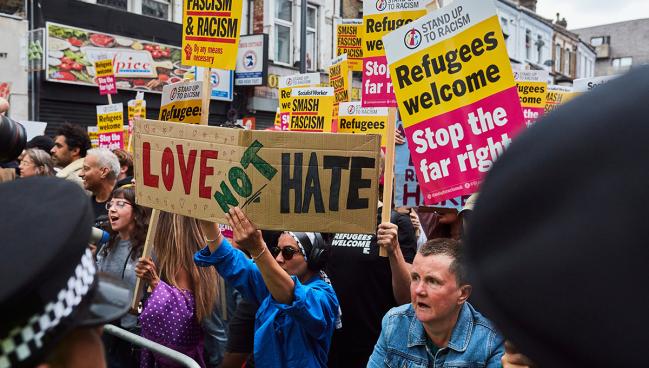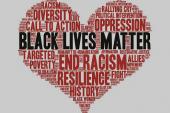Racism Is Still Here—Some of Us Are Just Too Blind to See It
Recent riots in the UK should make it starkly clear: unless we address inequalities, we will continue to fail our fellow citizens.

At the height of the Roman Empire, a third of the world’s population lived under Roman law, making it one of the most diverse empire ever seen but also posing unique challenges for its leader, Emperor Trajan. The Romans struggled with how to peacefully incorporate such diversity in a way that balanced the prosperity that peace brings against the fears and prejudices of the population.
The Roman constitution of AD 212, known as Constitutio Antoniniana, declared that all free men in the Roman Empire were granted full Roman citizenship (and all free women the same rights as Roman women). This helped to lay the foundations for the concept of citizenship, ensuring equality for the millions of people from diverse cultural backgrounds and beliefs spanning Europe, Africa, and Asia. In the ensuing years, however, the local populations of societies struggling with the same challenges the Romans faced—increasing ethnic, racial, and religious diversification through social migration, wars, or changing political borders—have failed to live up to the ideals of ancient Rome.
Race violence has a long history in the UK: the slaughter of the Jews of York in 1190, the anti-Italian uprisings of 1456, the numerous race riots of the 1980s when I, as a child, first experienced it firsthand. One of my earliest memories was of a neighbor racially abusing and shouting at my father that “foreigners” like him were taking jobs from the truly “British.” As a child of immigrants from Cyprus, I grew up fearful of the far-right gangs of skinheads who beat up anyone they perceived to be different—I kept my head down and worked hard to better myself through my only avenue for escape: education.
There were children at my school in the early 1980s who had swastikas or the initials of the extreme far-right National Front carved into their school bags. Even the pages of my math textbook at school, passed from one year to the next, were covered in graffiti of swastikas, racist words, and offensive cartoons of Black and Asian people being shot, lynched, or killed on most pages. Every time I opened it, I was reminded of the hate many of my peers felt about people they deemed different from themselves. When I complained to my math teacher, I was told to ignore it.
Like many, I thought things had improved over the last four decades. As of the 2021/2022 census, 16% of people in the UK were born abroad, numbering 10.7 million people. I felt that while racism undoubtedly still existed, it was at the fringes of society: diversity was finally becoming part of the very fabric of our society.
That was all to change on July 30, 2024, following the fatal stabbing of three children, a crime that was quickly—and falsely—attributed to a Muslim asylum seeker. Over the next week, riots broke out in towns and cities across England and Northern Ireland, fueled by Islamophobia, racism, and anti-immigration far-right politics. People of color were attacked, mosques and hostels housing refugees and asylum seekers were set on fire, community centers were destroyed, Muslim and Asian businesses were looted, “checkpoints” were set up targeting nonwhite drivers, who were hauled from their cars and attacked. Healthcare workers were stoned for simply going to work, told to go home from where they came from, had their vehicles burnt, were spat at, and were racially abused. People marched on our high streets delivering Nazi salutes—something the Nazis themselves never achieved in World War II.
The sheer scope and numbers of people involved in these events shocked me and many others, destroying my belief that the overt racism I experienced 40 years ago no longer existed in multicultural Britain.
And here’s the point, racism doesn’t simply appear overnight; people don’t suddenly decide to become racist. Some of us working in healthcare already know this. In every area of healthcare studied, we consistently see that patients of color are systematically disadvantaged, from referral to specialist services to receipt of guideline-recommended care and clinical outcomes. Disparities in the treatments and outcomes among minority ethnic groups are profound and, from a health perspective, will have a greater long-term impact on communities than these riots will ever do.
And it’s not just patients that experience racism. Surveys of doctors in training have shown that a significant proportion of trainees have encountered racism in the workplace, either from patients or from fellow staff members. The ability to progress within one’s career is often dependent on race. Even our regulator, the General Medical Council, is far more likely to suspend a doctor’s license to practice if they qualified overseas or are from nonwhite backgrounds. Racism has always been here: the majority of us simply haven’t seen it or lived it day-to-day. It is only through these riots that our eyes have been opened to the racism experienced by many colleagues and members of our community in their everyday lives, especially Islamophobia and anti-Semitism—two faces of the same coin.
We as a nation have failed to challenge the growth of racism in our communities, our workplaces, and our media. This isn’t an isolated problem of “right-wing thugs” sowing unrest in our streets. We cannot tell ourselves that these riots were one-off events and continue on as if has nothing happened. Racism is pervasive in all our workplaces and within our healthcare and educational systems, and unless we address these inequalities, we will continue to fail our communities.
The Constitutio Antoniniana proposed a framework for peaceful societal equality amongst diverse groups—2,000 years later we still haven’t achieved it.
We need to acknowledge that many of us were shocked by the riots that rocked Britain this summer, having been oblivious to the pervasive racism around us because it does not affect us every day. This isn’t just a problem of the “far right” and disillusioned. We need to address the social inequalities that laid the groundwork for these riots, rebuilding public services and involving Britain’s Black, Asian, and other minority ethnic groups who make up a significant proportion of the working-age population and are also the patient groups who face the biggest health and social inequalities now and in the future.
Over the Wire is a first-person blog and does not reflect the editorial position of TCTMD.
Mamas Mamas, BMBCh, DPhil, is the Senior Clinical Editor at TCTMD. He is the Clinical Director for the Centre for…
Read Full Bio




Comments